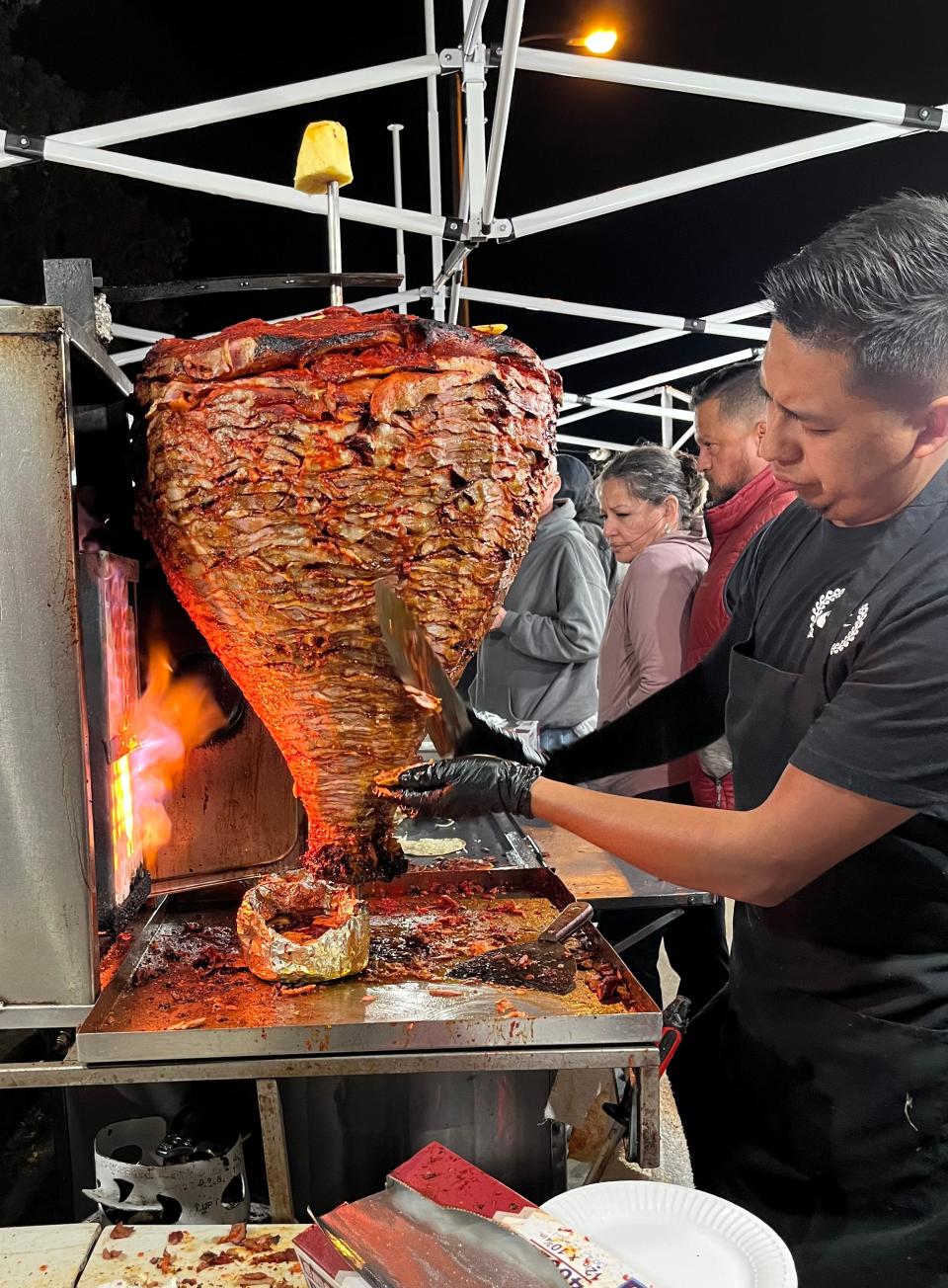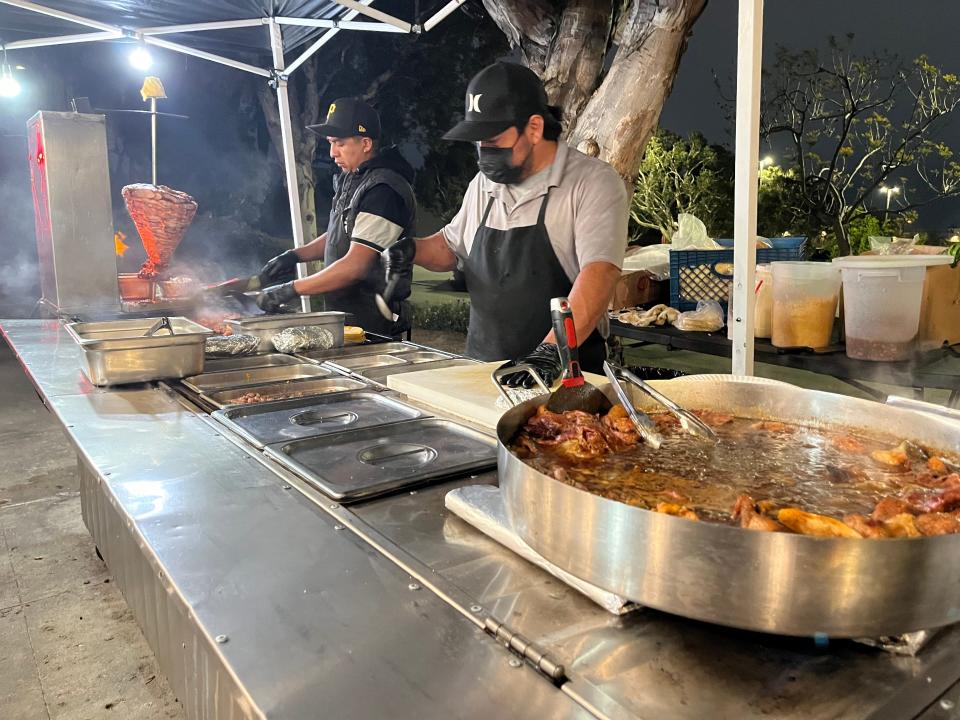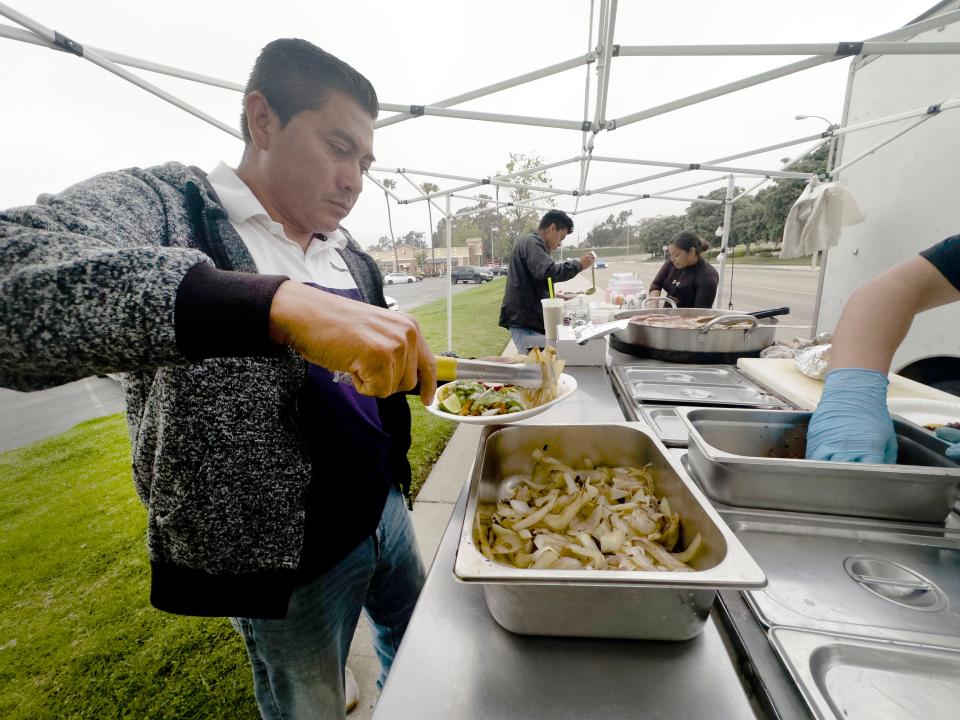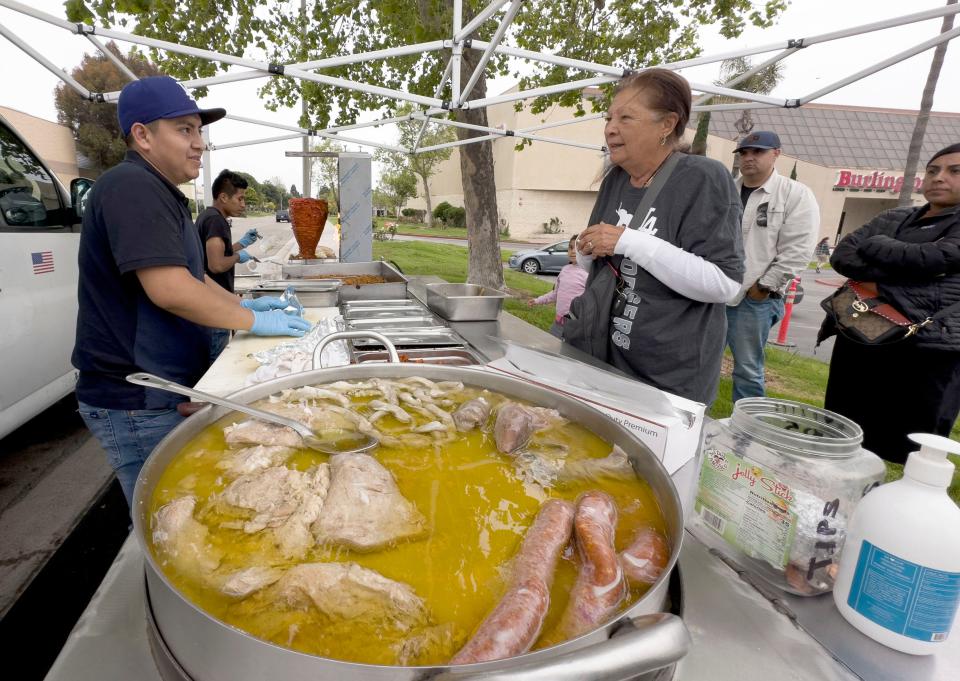Sidewalk food stands in Ventura County draw crowds, frustrate legal eateries, inspectors
It’s become a daily ritual all over Ventura County.
At around 5 p.m., a white van pulls up to a street corner or a stretch of sidewalk. A few people get out and unload essentially an entire outdoor restaurant: tables, a shade structure, maybe a string of lights, meat, tortillas, jars of aguas frescas, tubs of salsa, a flat top griddle, a propane or charcoal grill, ice chests, warming trays, and almost always a trompo, the vertical rotating spit to broil pork on an open flame for tacos al pastor.
At the end of the night, it all goes back in the van, and there’s no sign the sidewalk taqueria was ever there.
These businesses don’t have menus, formal names or easily identifiable owners. They also don’t have running water, proper refrigeration or health department permits to prepare and sell food.
There are dozens of these food stands in operation every evening in the county, with the heaviest concentrations in Oxnard and Ventura. Most of them set up in the same spots every night and many have loyal customers, long lines and glowing reviews on Yelp and Google.

Inspectors with the Ventura County Environmental Health Division have shut down unlicensed food stands nearly 50 times since they began cracking down on them last summer, but it’s had little effect on their ubiquity. Most of the time, they’re back at the same place the next night or even later the same night.
If the inspectors seize the food, another van full of supplies rolls up, sometimes within an hour. Confiscating grills and other equipment might put a food stand out of business for a day or two.
The pop-ups first started popping up in Ventura County in 2020, early in the COVID-19 pandemic, and they've become more common over the past year and a half, said Charles Genkel, the director of the Ventura County Environmental Health Division. They're even more common in Los Angeles, where diners can choose from a wide variety of sidewalk cuisines. Here, Genkel said, they're almost all Mexican food, with similar menus.
Police, health and code compliance departments in Ventura County have received hundreds of complaints about unlicensed street restaurants. Some of the most consistent complaints have come from the owners of legal, fully permitted food trucks. A group of about 30 such food truck owners has been urging the county and cities to do more to combat what they say is unfair competition from the unlicensed vendors.
"It's not fair to us, because we have a lot of expenses and they hardly have any," said Alejandra Leyva, who owns a permitted food truck in Somis called Don Taco. "We think it's not right for a person to open a place like that and take away our business. … We have friends whose trucks are going out of business because of this problem."

Permitted Ventura County food truck owners frustrated
The biggest expense in a food truck business is the food truck. It's essential because there's no way to get a county health permit without one. Leyva said he paid $60,000 for a used truck to open Don Taco six years ago, and a new one today could cost $150,000.
"It's a big investment for us," Leyva said. "We save for years to do that."
To qualify for an environmental health permit, food trucks owners must pay rent to a commissary to park their trucks overnight. In addition to giving the authorities an address where they know they can find the truck, commissaries provide a place to clean and service the truck and refill the water and propane tanks, along with extra indoor space for refrigeration and food preparation.
Commissary rent is about $1,000 a month, Leyva said. Food trucks also need a space to park when they're open, and that means paying more rent to a private property owner. Then there are sales taxes, payroll taxes and insurance as well as the cost of business licenses and health permits.
“You have so much to go through, and then somebody just puts out a table and a grill and starts selling on the street,” said Felix Pineda, who owns a food truck in the Oxnard area.
Pineda, Leyva and their fellow permitted vendors say they’ve spent most of the past two years trying to get the county and the cities to do something that will permanently put their unlicensed competitors out of business.
"We're not really getting anywhere," Leyva said. "We're in the same spot since two years ago. We're looking for answers, for help, and nobody does anything."
6,500 pounds of food seized from unlicensed food stands
Genkel said he understand their frustration, but thinks his department is doing everything it can with the resources it has.
The Environmental Health Division is responsible for permitting and inspecting every restaurant, food truck and other licensed facility in Ventura County. It has 10 inspectors to do that work and to respond to complaints about unpermitted vendors. The department is budgeted for 18 of those positions, but it’s been hard to hire people, and eight spots are now empty, Genkel said.
The licensed food truck owners say they suspect the pop-ups aren’t being shut down because they open at or after 5 p.m., outside of the regular working hours for health inspectors. Genkel said that isn’t true, but he said the hours do present a challenge. Enforcement actions outside of business hours require more planning and often involve overtime pay.
The county also coordinates its efforts with city code inspectors and police departments. So far, there hasn’t been any violence or disorder when a pop-up is shut down, but it’s an inherently fraught situation, especially if inspectors are confiscating equipment. Genkel said he won’t let his people go without police backup. Every enforcement action also needs a translator present if the inspector doesn’t speak fluent Spanish.
“We’ve been fortunate here in Oxnard, and we haven’t had any incidents where people have been aggressive or violent,” said Denise Morehouse, an assistant Oxnard police chief. “What usually happens is, everyone gets booed by the customers, because we’re letting them know they’re not going to be able to purchase any food right now.”

There isn’t a lot the police can do. A state law in 2018 decriminalized sidewalk vending, so the police can’t arrest anyone or issue misdemeanor citations. Counties and cities can assess “administrative penalties,” but those fines aren’t worth the trouble in these situations, Genkel said, because there’s no way to take someone to court for not paying them.
“Most, if not all, of the vendors we are encountering at these pop-up stands do not have identification, so following up on that and discouraging them through fines is ineffective,” Genkel said.
He said the law appears well intentioned but was probably aimed at people selling fruit or packaged food from push-carts, not at sidewalk restaurants cooking meat without permits. The law does allow cities to pass their own sidewalk vending regulations, and then cite people who violate them. Genkel said it would help his department’s efforts if cities in Ventura County did that.
Under the current system, inspectors give the person running the food stand a written order to shut it down. They can also seize the food that’s being prepared, and sometimes, they confiscate the equipment, but hauling it away takes more planning and more people.
Since August, the Environmental Health Division has closed unlicensed food stands 47 times, Genkel said. It has seized about 6,500 pounds of food, along with 20 flat-top grills, 12 vertical broilers, two barbecue grills and three steam tables.
That’s not nearly enough, the owners of legal food trucks say. They want more seizures of grills and other equipment, and consistent enforcement at the locations where pop-ups regularly operate.
“That’s the main problem,” Leyva said, referring to sporadic enforcement. “They go out one time, and it takes months to go out again.”
The lure of meat on an open flame
The Environmental Health Division is also trying to educate consumers about how to spot an unlicensed vendor, and the risks of food-borne illness from such operations. They’re not hard to identify; any food stand operating on a public sidewalk is almost certainly unpermitted, as is anyone cooking outdoors. The county doesn’t issue permits for outdoor kitchens, except for vendors at temporary events like festivals and fairs.
"I think the customers know it's not legal, but you can go there and feel like you're in Mexico with the street food, and it's exciting," Pineda said. "The visibility brings a lot of customers, and I understand why."
Relying on consumers to avoid unlicensed vendors is “like just telling people you shouldn’t be driving 90 mph on the freeway,” he said. “The police need to come and enforce the law. Otherwise, people will be racing on the freeway.”

On a recent Friday, Emily Cerda was one of the first customers of the evening at an outdoor taqueria on a commercial street in Ventura. She’s a regular, and said she comes from Oxnard for the quality of the food and the low prices.
“You can get two tacos at a restaurant and it’s going to cost you close to $10, and here it’s $5,” she said, while waiting for her order of tripas and al pastor.
Cerda wasn’t aware that her favorite taco stand doesn’t have a permit. “It would be better if they did,” she said, but knowing they don’t have one won’t make her stop coming.
“It’s a struggle for everybody. They’re only trying to make a living,” she said. “It’s better to make an honest living like this than to go rob a damn bank, you know?”
Not your grandmother's taco stand
That’s a common attitude among customers, but city and county officials and legal food truck owners all say it’s a misconception when it comes to the owners of the pop-ups. No one has really identified who they are, but there is evidence they’re mostly based in Los Angeles, and some appear to own multiple pop-ups in Ventura County.
“This is not generally somebody that is a neighbor or a mother or grandmother from the neighborhood. They seem to be organized and coming from out of the area,” said Jeff Pengilley, the city of Oxnard’s assistant director for community development.
“These guys make a lot of money,” said Noe Santana, the owner of a licensed food truck in Moorpark. “They can easily buy a food truck, but they don’t want to. … It’s not because they can’t be legal. They don’t want to be legal.”
Legal truck owners also suspect the pop-ups are paying their employees less than minimum wage. Pineda said one member of their group approached a pop-up and talked to one of the employees. The worker said he is paid $60 for a full day's work, including chopping meat and vegetables at another location before the stand opens, setting it up and taking it down, and working the grill.
“We have a responsibility to the people who work for us,” Leyva said. “They don’t have any obligation to anyone.”
At Cerda’s favorite pop-up in Ventura, the workers declined to be interviewed except to say, in Spanish, that they didn’t own the place and that business has been good, though they’ve been shut down twice. The first time, they were just ordered to close, but the second time, health inspectors took their food. Both times, they opened back up again in the same location.
Tony Biasotti is an investigative and watchdog reporter for the Ventura County Star. Reach him at tbiasotti@vcstar.com. This story was made possible by a grant from the Ventura County Community Foundation's Fund to Support Local Journalism.
Editor's note: This article was updated to correct the spelling of Denise Morehouse's name.
This article originally appeared on Ventura County Star: Southern California sidewalk vendors frustrate food truck owners

